International Forum on South China/West Philippine Sea Dispute in Manila Highlights Philippines’ Growing Confidence In Row With China
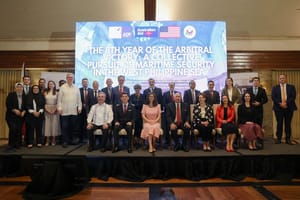
Exclusive Report By Tayo Staff in Manila
(Makati, Philippines)-Adhere to the rules based international order. Continue to partner with like-minded nations. Always advocate for peaceful resolutions. Never waiver from what is legally and rightfully ours. Modernize, prepare, and plan for the long haul.
These were some of the major themes on display on July 12 at a jam-packed Manila Polo Club in Makati for a forum titled, "The 8th Year of the Arbitral Victory: A Collective Pursuit of Maritime Security in the West Philippine Sea."
The event, which was attended by Tayo staff, was organized by the Manila-based Stratbase ADR Institute (ADRi), an independent international think tank and research organization, in partnership with the Australian and U.S. Embassies in the Philippines. The day-long conference brought together hundreds of guests from the Philippine government, the armed forces, the diplomatic community, academia, media, and civil society organizations exactly eight years to the day when the Philippines notched its historic legal victory over China.
The “ADR” in the Institute’s name are the initials of the late Albert del Rosario, the former Secretary of Foreign Affairs of the Philippines from 2011-2016, who led the country in its successful case against China’s claims in the South China/West Philippine Sea.(Under Philippine law, per Administrative Order No. 29 issued by then-President Benigno Aquino III on September 5, 2012, the West Philippine Sea refers only to the portions of the South China Sea which the Philippine government claims to be part of the country's exclusive economic zone (EEZ) as prescribed the UN treaty UNCLOS.)
Tayo will be offering regular coverage of the South China/West Philippine Sea issue, as its complicated transnational nature has reverberations for Filipinos both in the Philippines and worldwide, as well as the global community in general. It’s also been a topic that has been the focus of misinformation across the diaspora. This article is one of many that will fact check and offer explainers on this evolving issue.
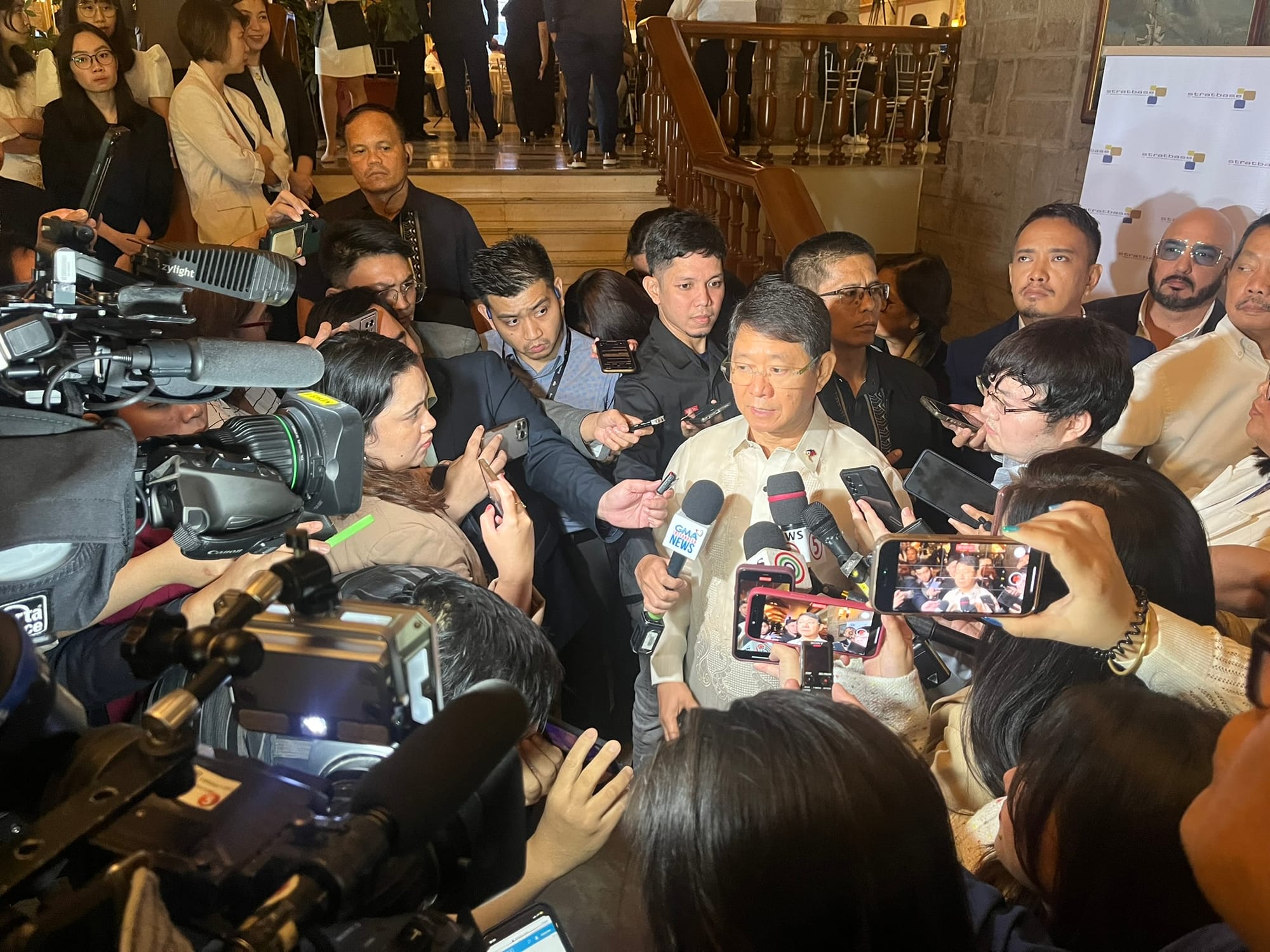
A Landmark Day in Philippine History
As the conference began with the Philippine national anthem, it was clear that that day, July 12, 2016, is now considered by many as a landmark date in Philippine history. That’s when the Permanent Court of Arbitration (PCA) in The Hague, Netherlands handed down its decision dismissing as illegal China’s expansive claims to nearly 90% of the South China Sea under its so-called “nine-dash-line.” The Philippines filed the case against China in 2013.
China, of course, vehemently rejected the decision, and has maintained its opposition up to this day. The last decade has seen Beijing put paid to its claims as Chinese nationals continue to build and occupy artificial islands inside Philippine maritime territory on what were previously just rocks and sandbars in the middle of the ocean. China’s provocative actions in the last two years, including harassing and intimidating Filipino fishermen and military personnel within legally recognized Philippine waters, indicate their seriousness and long term plans to follow through on claiming most of this ancient body of water.
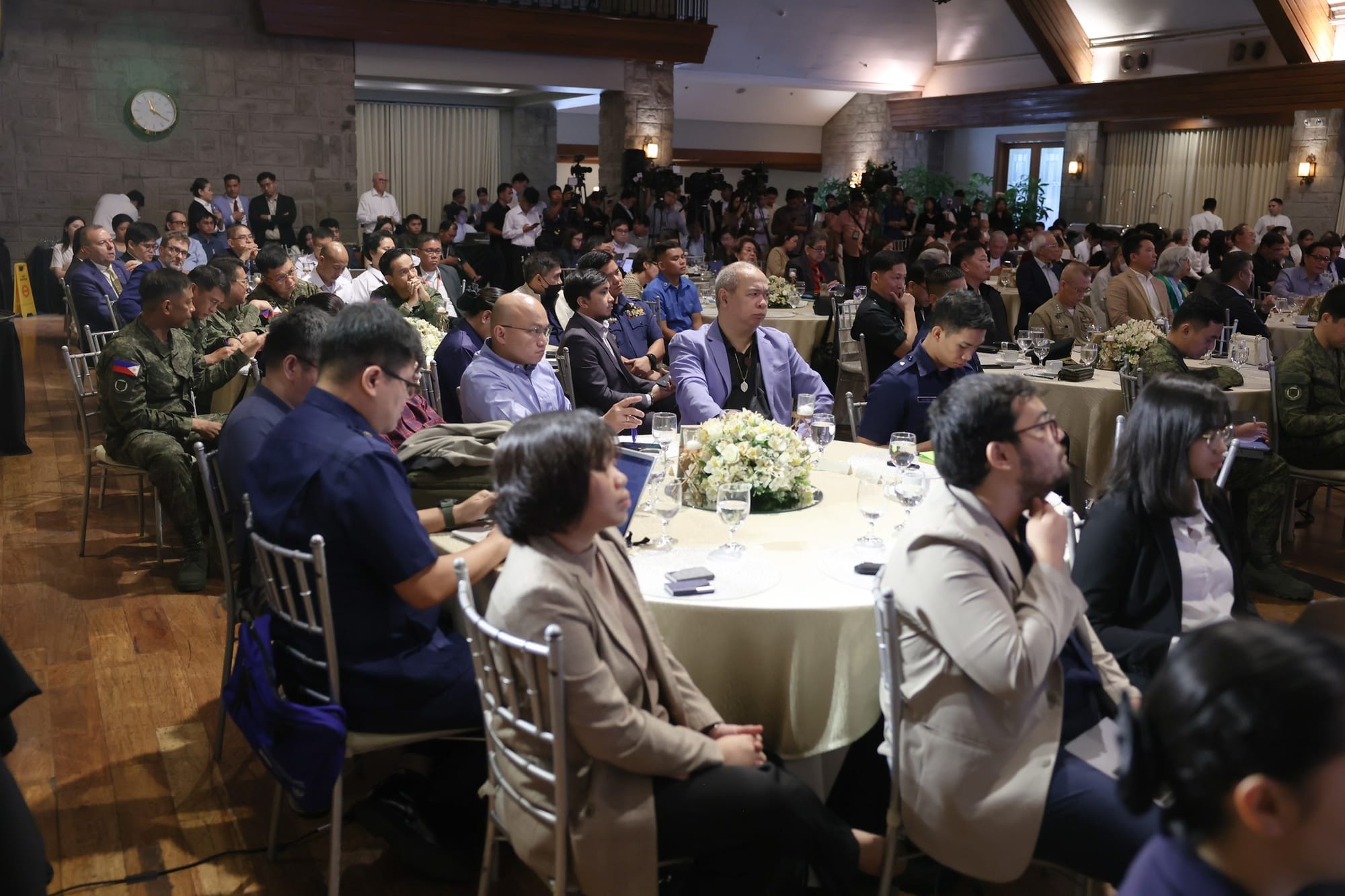
These realities, along with the fact that the arbitral ruling is non-binding—meaning there is no actual enforcement mechanism to get to China to comply—certainly give off the appearance of an almost hopeless situation for the Philippines and its allies. Can the Philippines truly ever hope to stave off an ever more aggressive world power in China, which wants what it wants and doesn’t seem to care what anyone else says?
The Philippines Finds Its Voice
While recognizing the immense challenges, the policy experts and others in the conference were hardly engulfed by gloom and doom. In fact, the mood at the Manila Polo Club eight years on from the PCA’s momentous decision could best be described as a combination of immense pride and more than cautious optimism.
This is because despite China’s intractable stance and formidable military might, the Philippines in 2024 has found itself in an increasingly stronger position than it was when the award was issued.
Back when the ruling came out, then-President Rodrigo Duterte, whose term ran from 2016 to 2022, had turned Philippine foreign policy away from former colonial power the United States and pivoted towards friendlier relations with China. As he settled into office, Duterte expressed reluctance in antagonizing Beijing by pushing China to accept the arbitral ruling, a period that also coincided with increased economic cooperation, including promises of loans and assistance for vital infrastructure by China. Besides, Duterte insisted, China was too powerful militarily, and the Philippines didn’t stand a chance in any armed confrontation.
Under the new administration of President Ferdinand Marcos, Jr., however, the Philippines’ policy towards the South China/West Philippine Sea issue has taken a 180 degree turn. Referring back to the 2016 PCA ruling as a foundation, the Philippines has mounted an all-encompassing approach in an attempt to assert its maritime territorial integrity over the so-called Exclusive Economic Zone (EEZ) as prescribed under United Nations Convention on the Law of the Sea (UNCLOS), a cornerstone accord signed by 164 countries, including the Philippines and China. This strategy involves initiating aggressive legal actions, partnering with sympathetic nations, modernizing the country’s armed forces, and regularly publicizing China’s activities in the disputed waters to the wider world.
“This is a landmark [ruling] by the arbitral tribunal and it shows that the international law is behind our back,” said Rear Adm. Roy Vincent Trinidad, Philippine Navy spokesperson for the West Philippine Sea, in his speech at the forum. “This invalidated China’s 10-dash line, nine-dash line claims in that area,” proclaimed Trinidad, noting that the arbitral ruling is the basis used by the government to continuously assert its rights in the West Philippine Sea despite China’s unilateral assertions.
“It would be a different story if we don’t have the ruling behind us. Now that the ruling is behind us, all of our actions are backed up by international law,” Trinidad remarked.
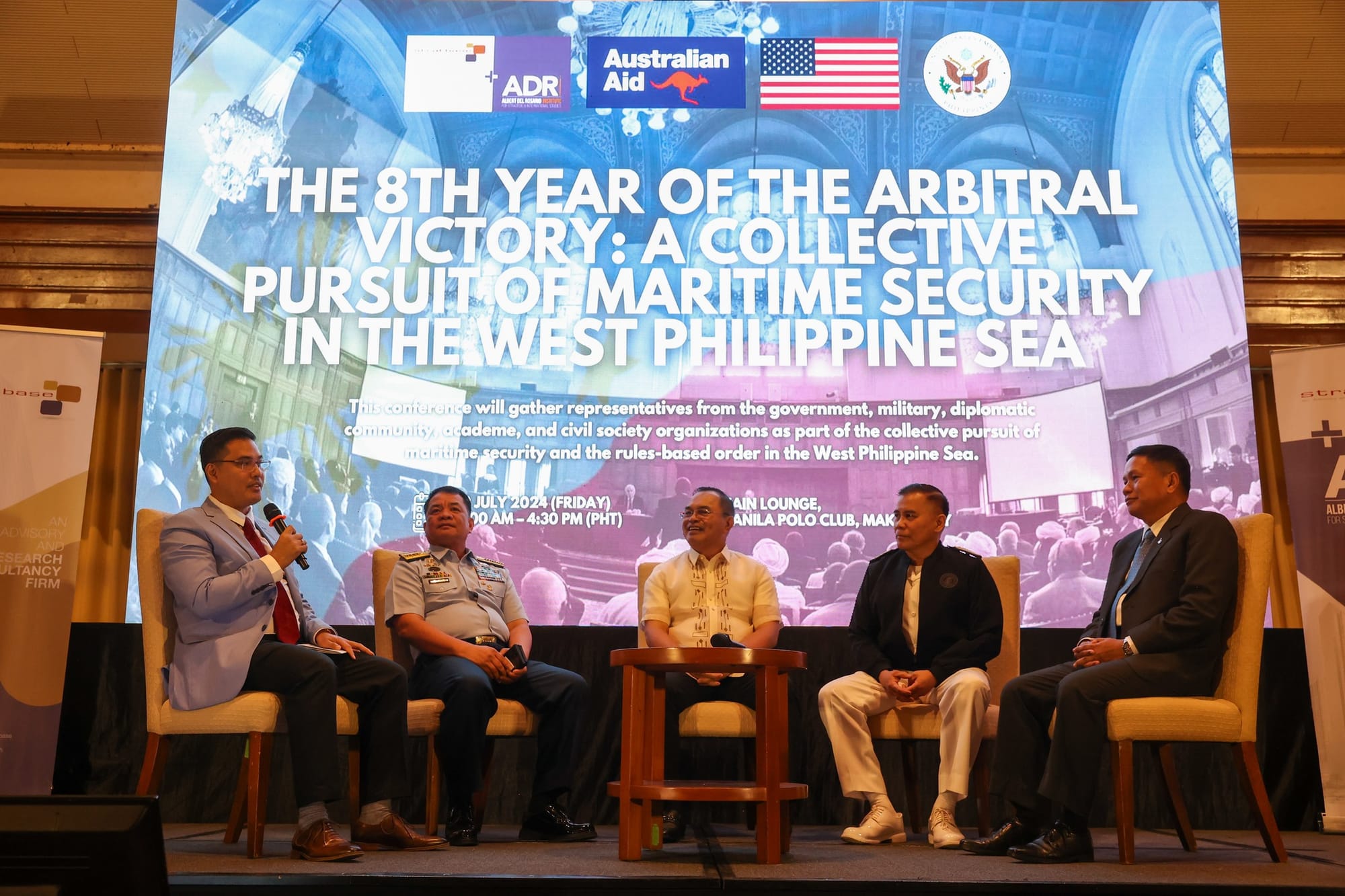
The International Community Rallies to the Philippines’ Cause
The Philippines' use of legal tactics to push back against China’s actions has garnered support from a number of other countries, as evidenced by the attendance of 26 foreign ambassadors and their representatives at the ADRi forum. In their remarks each delegate thanked the Philippines for its leadership in advocating for a rules-based order in the South China/West Philippine Sea, for its efforts to strengthen international maritime law, and overtures for a peaceful resolution to the increasingly dangerous situation.
“The Philippines has the support and backing of many like-minded countries who are present here today,” Japanese Ambassador Kazuya Endo told the audience. “ As allies, partners, friends, we stand united in navigating these uncertain waters and uphold the fundamental principles that safeguard our shared waters.”

Australian Ambassador HK Yu said her country will continue to help the Philippines build its capacity and contribute to maritime security. “The Philippines is not facing this challenge alone,” Yu said. “It is a challenge that cannot be faced alone, not by any one country in this room. So we will continue to pursue, collectively, maritime security in the West Philippine Sea. I can tell you this. You can count on Australia.”
French Ambassador to the Philippines Marie Fontanel reaffirmed that Paris, and the European Union, regard the PCA as a significant tool in upholding a rule-based order in the region. “As increasing tensions become the new normal, the risk of uncontrolled escalation with regional or even global repercussions cannot be underestimated. When it comes to these issues, France shares with the Philippines a non-confrontational approach firmly anchored in the respect of international law and multilateralism,” Ambassador Fontanel said. “In that regard, the 2016 arbitral award sends to the world a powerful message for which we must thank the Philippines,” she added, while also revealing that France was looking to sign a visiting forces agreement with Manila by September.
France’s plans, along with others, reveals that the Philippines’ allies are interested in more than congratulatory words. This is evident in the increased assistance and backing from the US, Australia, and the recently signed defense pacts with Japan and Vietnam.
One such piece of concrete assistance was enumerated by Canadian Ambassador to the Philippines David Hartman, who discussed his nation’s contribution to the Philippines of a dark vessel detection (DVD) system in 2023. Since many Chinese ships operating in the South China Sea turn off their automatic identification system transponders (AIS) in order to avoid detection, the DVD system helps the Philippines locate these “dark” ships.
“The DVD system provides an enhanced view of illegal maritime activity, protects fisheries and marine resources, and disrupts IUU (illegal, unreported and unregulated) fishing and other criminal activity,” Hartman said.
Keeping Up the Pressure While Sticking to the Law
Retired associate justice of the Supreme Court of the Philippines Antonio Carpio has drawn attention to the situation in South China/West Philippine Sea for years, emerging as a prominent advocate for the legal course the Philippines has charted. In his speech to the forum, Justice Carpio urged the Philippines to “pile up more arbitral awards” against China to negate its “baseless and expansive” claim of almost the entire South China Sea. “The legal approaches in countering China’s aggression are the countermeasures most dreaded by China. Why? Because China has simply no defense against these legal measures,” he said.
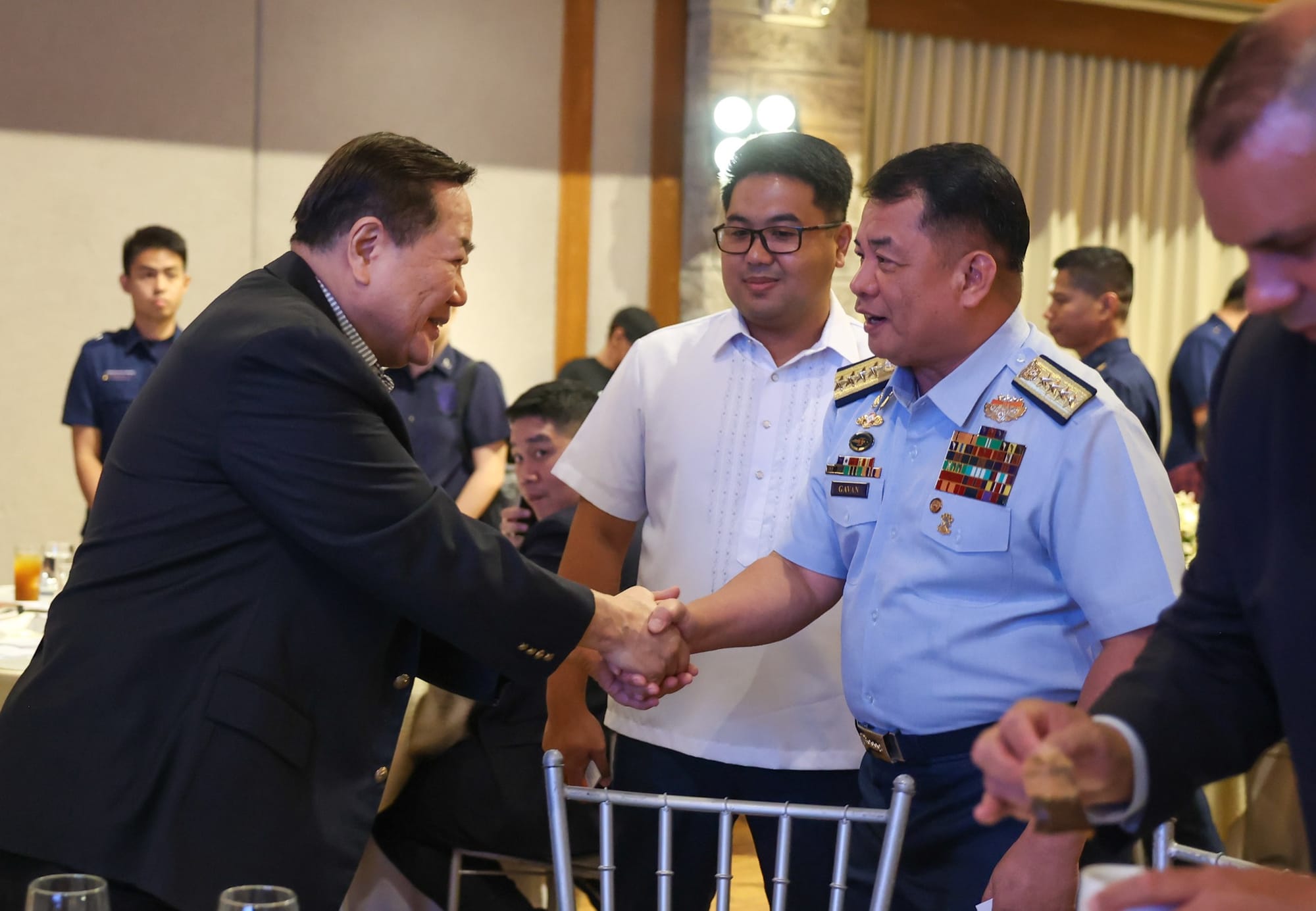
Dr. Ronald Holmes, president of public opinion polling firm Pulse Asia, revealed a new survey that showed that the country’s initiatives on the South China/West Philippine Sea are resonating with Filipinos and stirring their sense of national pride, with 76 percent of respondents favoring the administration’s assertive stance.
Presidential adviser General Andres Centino (Ret) related how the Philippine government has adopted an “all of government’ posture towards the West Philippine Sea, pointing to the recently promulgated Presidential Order 57 establishing the National Maritime Council, which aims to streamline various government agencies to coordinate policies, strategies, and messaging. The key, he said, was for the various bodies to figure out how to “cooperate in consolidating ways to promote our 2016 arbitral victory in accordance with national and international law.”
One of the concepts frequently mentioned at the forum was the Philippine government’s “transparency initiative.” US Air Force Colonel Raymond Powell (Ret) observed that in the past–especially during the Duterte presidency–the Philippines refrained from publicly highlighting China’s maritime actions for fear of retaliation from Beijing. This all changed under the current administration, which has embarked on an active campaign to attract global publicity to the aggressive measures currently being employed by China.
"Transparency is an important weapon in the arsenal of a democracy whose case is based on being right,” Powell said. This strategy, Powell noted, has yielded success in shining a light on Beijing’s reliance on so-called Gray Zone Tactics, which refers to “the use of non-military means – below the threshold of armed conflict – to achieve political objectives.”

A Need to Prepare for the Long Haul
Nobody in attendance, however, was under any illusions that the road forward for the Philippines will be easy. Rommel Jude Ong, Professor of Praxis at Ateneo School of Government, suggested that the Philippines needs to pour any and all resources into modernizing its armed forces and its strategic planning, while also noting that a lack of funds stands in the way of fully implementing such an initiative.
"We are an archipelago,” Ong told the conference. “We have too many maritime vulnerabilities that we need to address. One of the long-term solutions is we have to look at industrial capacity because that would address the shortfall in the number of hulls and ships that we can deploy at sea. The solutions are all long-term so we can secure the entire archipelago."
Veteran journalist Marites Vitug, editor at large at Rappler, warned that China’s government is heavily involved in creating and spreading disinformation about the South China/West Philippine Sea dispute amongst Filipino audiences. In particular, she cited examples of multimedia content falsely depicting President Marcos declaring war on China, ranging from text articles and deep fake photos to videos circulated on YouTube.
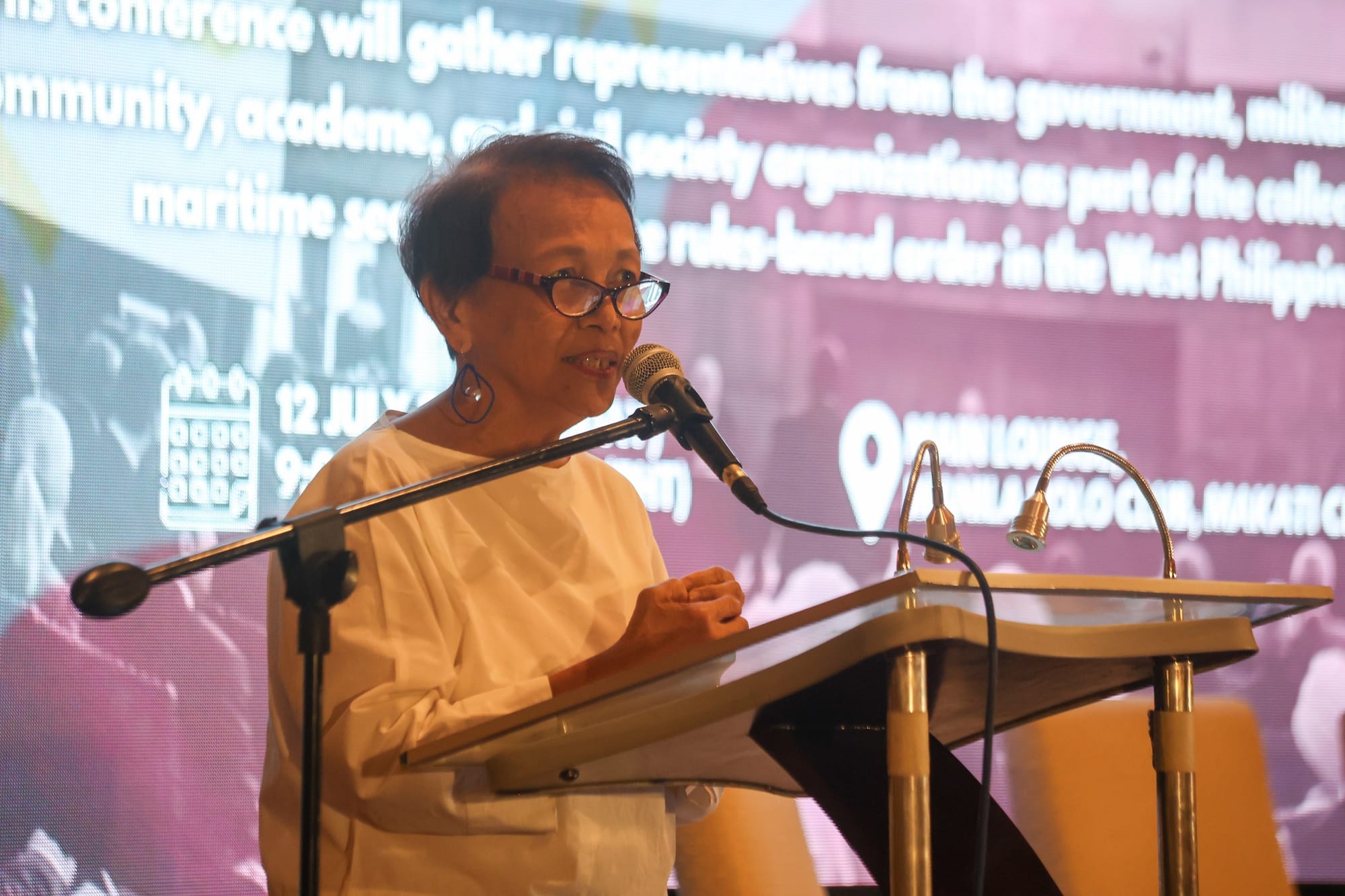
“There are pro-China groups on social media,” Vitug said in her address. “The Philippine government needs to investigate disinformation. We need a united approach to combat disinformation. Appeasing China doesn’t work. The goal is to bully the Philippines and get the Philippines to agree to China’s demands.”
Vitug tempered her comments, however, with the belief that while Filipinos need to remain vigilant, they are largely not taking the bait laid out by Chinese propaganda agents so far. “Chinese disinformation hasn’t had much effect in the Philippines,” she said. “But China is in it for the long haul.”
Based on the plethora of speeches and timely information revealed at the ADRi forum, so too is the Philippines and its ever increasing roster of allied countries. Despite the massive challenges, the country appears to be moving into the future brimming with confidence, hope and a firm belief that might will not and cannot win out, that following international law is the only path forward to establish a South China/West Philippine Sea as a place of peace, justice, fairness and prosperity for all stakeholders.
“We are on our 8th year. We stood up on this issue in 2013 when we filed a case because we believe that international law can overcome a bully,” Professor Victor Andres Manhit, president of ADRi, told Tayo. “And international law sided with the Philippines because we know we are right. Our basis is always that within the community of nations, we are protected by what is being defined within the UNCLOS. And the UNCLOS defines for us a rules-based order and we saw how nations after nations supported us after 2016. And we will continue to build that to educate more nations to be with us.
“[China] can keep saying ‘no.’ They can do whatever they want. But as we strengthen with nations after nations they will need to rethink. So we believe that this can deter moving forward China’s unilateral actions, when they see stronger commitments from nations who believe and support this arbitral award.
“I have always been optimistic because I’ve seen it go from zero and where are we now. I’ve seen even ASEAN countries now even coming out believing in the rules based order. Not all of ASEAN but at least a part of it. The ASEAN maritime nations are slowly speaking up.
“The position and the direction of our government are firm. We will not yield. We will never yield. We will be steadfast. We have the whole of Philippine society behind us as we assert our rights in the West Philippine Sea, and the support of like-minded states in the community of nations. These give us hope and confidence that we will be able to safeguard our national sovereignty, territorial integrity, and economic rights in the West Philippine Sea.”


